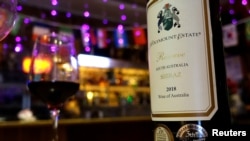China is opening another chapter in its bitter trade and diplomatic dispute with Australia with the launch of a second probe into Australia’s wine imports.
China’s commerce ministry announced Monday that it will investigate over three-dozen government subsidy programs for the Australian wine industry. The probe will last one full year.
Australian Federal Trade Minister Simon Birmingham issued a statement pushing back against Beijing’s claims, saying the government’s research and development programs equate to subsidizing the country’s wine exports.
“The government will work with our internationally renowned wine industry to mount the strongest possible case against these claims," Birmingham said.
The new probe comes nearly two weeks after the ministry said it was launching an anti-dumping investigation into Australian wine imports, alleging that winemakers have sharply cut the price of the products they were selling in China, subsequently damaging China’s domestic wine industry.
China is the leading market for Australian wine exports with over $790 million in sales last year for a 37% market share, with France a distant second at 27%.
The anti-dumping probe is the latest move in China’s apparent retaliation over Australia’s push for an independent probe into the origins of the novel coronavirus pandemic, which was first detected last year in the central Chinese city of Wuhan.
Beijing has imposed heavy tariffs on Australian barley and suspended Australian beef imports, and has also advised its citizens and students to reconsider Australia as a destination for travel and education, citing racial discrimination.
China is also Australia’s largest trading partner, with two-way trade worth $170 billion last year, according to Reuters.




